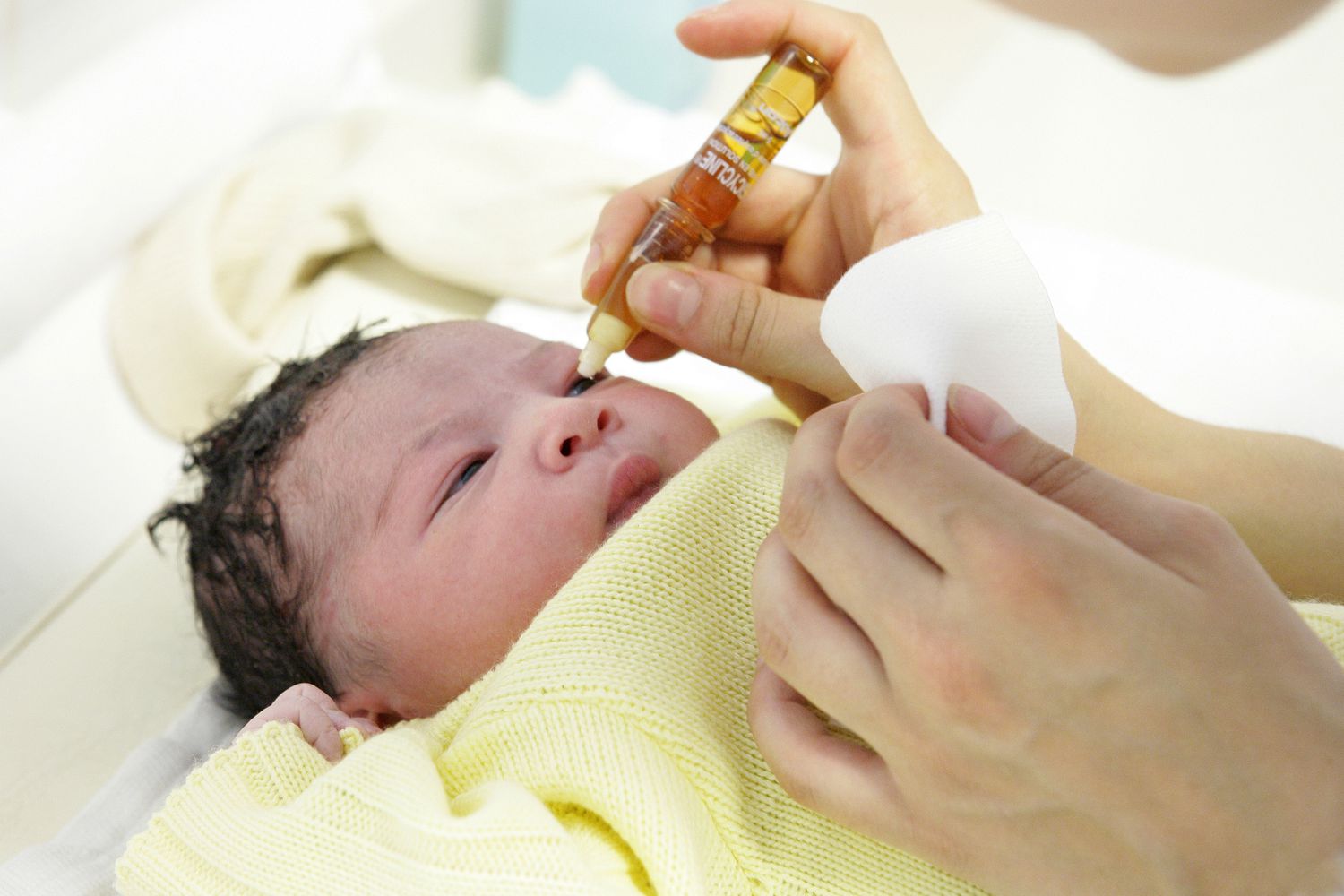Well, why do you think eye-related ointments are given to children at the time of birth? Some of the babies develop pink eye color just hours after they are born.
They may also develop certain bacterial infections at the time of their birth. When left untreated, this can lead to permanent blindness for the kids in extreme-case scenarios.
Using a newborn eye color predictor, you can determine if a baby’s eye color during the time of birth will continue for the rest of its life or if the eye color gradually changes over the growing years of the baby.
Therefore, giving eye drops or eye-related ointments becomes the need of the hour for newborns.
The eyelids become cloudy or moist immediately as the surgeon puts eye drops or eye medicine into the eyes of the newborn.
The eyes of a newborn may immediately turn red or swollen after applying eye drops, ointment, or medicine. However, the medicine should not be wiped or cleaned from the eyes.
Let us move on to learning the pros and cons of using eye ointments or creams for newborns.
Pros of Giving Eye Medicine to Newborns
These are the pros of giving eye medicines or eye-related ointments to newborns.
1. Prevent the Onset of Allergies and Infections
Newborns may develop severe rashness or redness near the eye area. This might be due to the prevalence of conjunctivitis or Vitamin K deficiency at birth.
Vitamin K deficiency, when left untreated, might lead to a series of long-term disabilities, including heavy bleeding of the upper thigs for the newborn.
Hence, Vitamin K injections are administered to babies by experienced eye doctors during the time of their birth.
2. To Eradicate Bacterial or Viral Infections
Moms who were sexually active during childbirth have a risk of contracting sexually transmitted diseases, say, chlamydial or gonorrheal ON.
If these infections are unscreened during the time of birth, there is every possibility that the newborns will catch these viral and bacterial diseases.
Therefore, these disorders are highly contagious and can impact retinal or pupil movements of eyes in newborns, and when left untreated, can lead to partial blindness.
Eye ointments like erythromycin prophylaxis can prevent further convergence of such bacterial or viral disorders that can impact the vision of newborns over the long run.
Cons of Using Eye Creams or Eye-Ointments
These are the cons or drawbacks of using eye creams, ointments, or eye-related medication. Let us have an overview of each of them.
1. Immediate Redness or Rashness Near the Eyelids or Pupil Area
After administering eyedrops or eye ointments, the eye region may immediately become red or swollen. However, these symptoms are temporary.
The eyedrops or ointments must not be wiped out or cleansed off immediately. The eye-related medication must penetrate the region.
2. Immediate Reactions After Administering Vitamin K Injections
Vitamin K injections might cause blurred vision in some extreme-case scenarios. These injections might lead to internal bleeding in newborns.
Therefore, it is always advisable that you get an expert opinion from a healthcare administrator before you go in for Vitamin K injections or heavy-dose eye medication.
Recommendations by the US Control of Diseases Committee
The US Control of Diseases Committee fully recommends that mothers should be properly screened for any form of severe bacterial or viral infections the mothers would be having during the time of childbirth.
This is mainly because if mothers have severe viral or bacterial infections, they become carriers or transmitters of these infections to their kids.
It is a standard protocol to use erythromycin immediately after a child’s birth. The erythromycin tube is similar to that of Vaseline.
The tube is directly squeezed into the baby’s eyes immediately post-birth. This is usually an antibiotic that must be administered within an hour after your newborn’s birth.
Learn the Downsides of The Treatment
According to the American Center for Disease Control, 15-25% of infants or babies exposed to eye-related antibiotics or medication experience blurred vision. However, this is only for a couple of hours after administering the same.
Babies also develop rashness or redness of eyes that are similar symptoms to that of conjunctivitis. Post-eye medication or ointment can be used to mitigate the overall symptoms kids face.
The baby can bond with his/her mom for at least an hour post-birth. This way, the mom can finish her first round of breastfeeding for the baby.
Immediately after being fed, the baby is taken to the eye examination counter on the hospital premises.
However, the baby is then allowed to sleep after administering an eye-related medication in terms of eye drops or eye ointments.
Once the child wakes up, most initial symptoms that cause discomfort to the child’s eye region eventually vanish.
Another downside to eye examination is that an immunity-related imbalance develops when the infant or newborn is exposed to eye-related antibiotics for the first time.
Here, the antibiotic-resistant or infection-causing bacteria continue growing while healthy or normal body bacteria get killed.
However, as a very minimal proportion of antibiotics is used for the initial eye examination of the infant or the newborn, this is not a huge concern for parents or healthcare providers.
Conclusion
You must thoroughly understand the pros and cons of administering eye-related medication for your newborn. As a mom, you must get screened against possible viral or bacterial infections before childbirth.
This is because you do not want to transmit or give away these impending infections to your newborns.
Some of the newborns may have Sulphur Allergy. Hence, you must check with your healthcare provider to see if the kid resists Sulphur injections.
Sulfur-resistant drugs can be provided in case you know your newborn is allergic to sulpha drugs.
With proper precautions and care, you can ensure your newborn receives the right kind of post-birth eye treatment it deserves!










